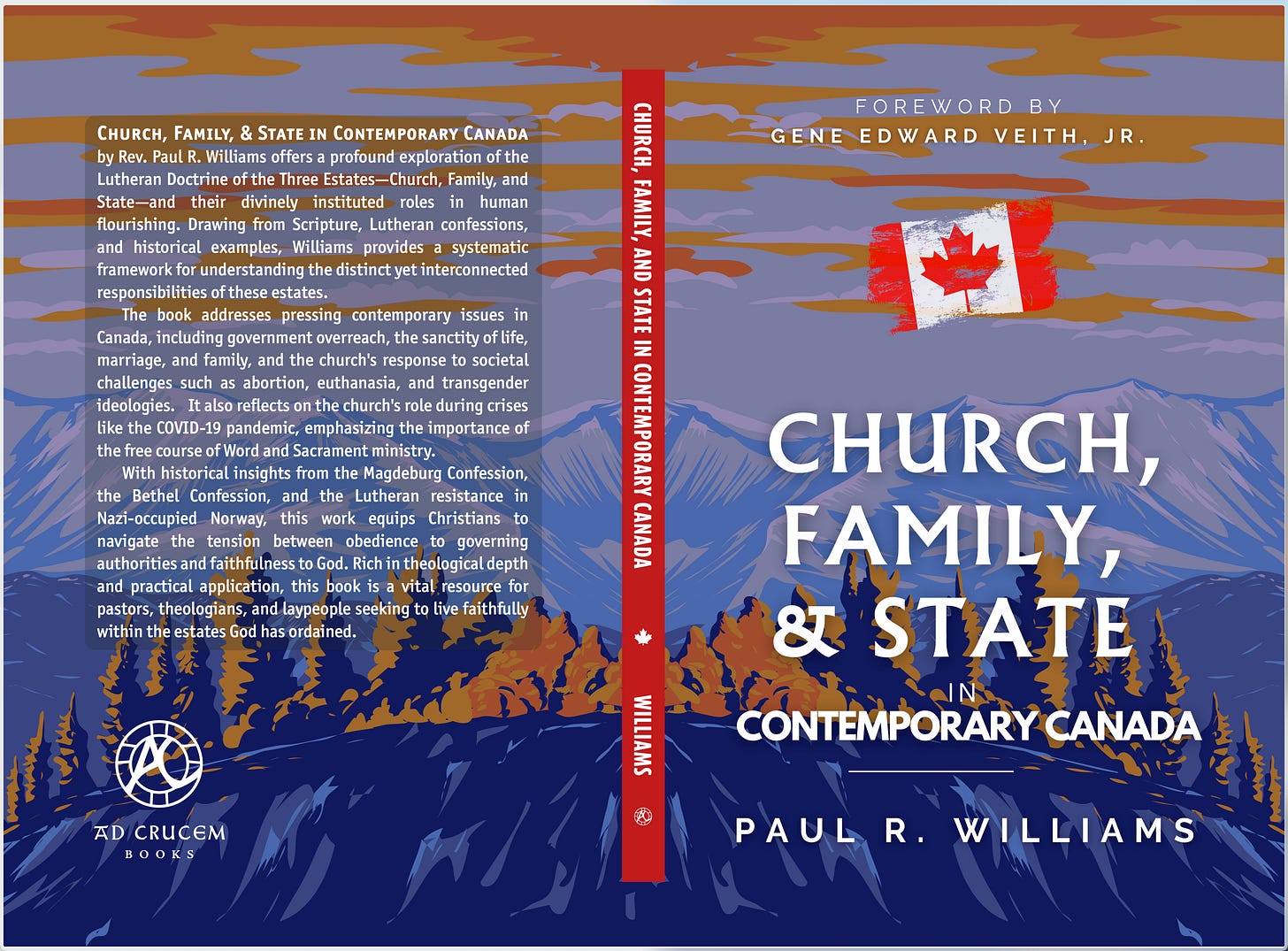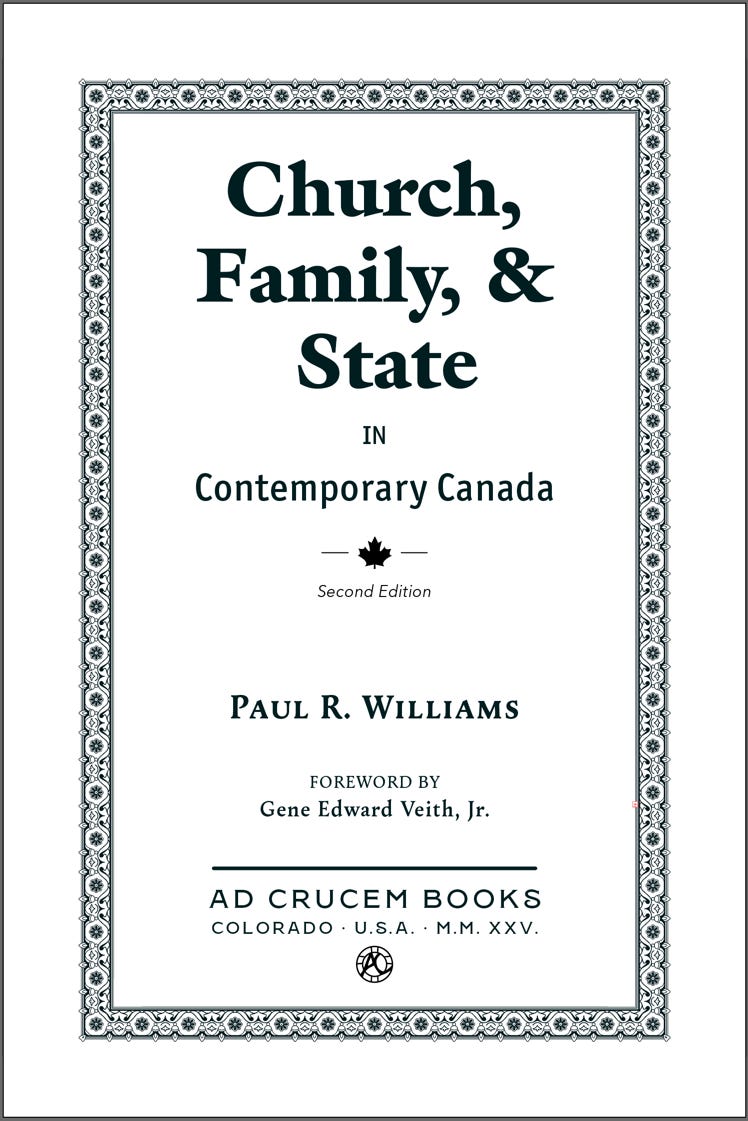The Three Estates Revisited: Announcing the Second Edition of Church, Family & State in Contemporary Canada
From Tract to Treatise: The Growth of a Modern Lutheran Classic
When Church, Family & State in Contemporary Canada, authored by Rev. Paul Williams and published by Ad Crucem Books, first appeared in April 2025, it arrived amid intense theological confusion within the Lutheran Church–Canada.
Pastors and laity were wrestling with the boundaries between Church, Family, and State—questions left raw by years of governmental overreach and ecclesiastical uncertainty.
The first edition—compact (5×8 in), dense, and urgent—offered a framework for recovering the Doctrine of the Three Estates, showing how God orders human life through Church (ecclesia), Family (oeconomia), and State (politia).
Ad Crucem Books has released the Second Edition (6×9 in)—a work fully re-architected for pastors, scholars, and thoughtful laymen seeking a deeper, more systematic appreciation of the Lutheran view of the Three Estates.
📘 Available now on Amazon as softcover, hardcover, and Kindle e-book :
Kindle e-book, $12: https://www.amazon.com/Church-Family-State-Contemporary-Canada-ebook/dp/B0FVRNQNH7/
Softcover, $15: https://www.adcrucem.com/products/church-family-state-in-contemporary-canada
Hardcover, $25: https://www.adcrucem.com/products/church-family-state-in-contemporary-canada
Every section has been expanded, clarified, and supported with references to Luther’s Works, the Book of Concord, and the broader confessional tradition.
Key structural improvements include:
1 A New Theological Architecture
The opening chapters now begin with
“The Three Estates and Their Vocations.”
This reframing integrates the Doctrine of Vocation—how God works through ordinary people to serve His creation. Drawing on Gustaf Wingren’s Luther on Vocation and Gene Edward Veith’s God at Work, Williams unfolds a richer vision of Christian life:
Every true vocation is a mask of God through which He feeds, protects, and governs His creatures.
2 Scholarly Depth & Doctrinal Precision
The second edition doubles the footnotes and citations. It clearly distinguishes:
The Two Kingdoms (how God governs by Law and Gospel)
The Three Estates (how God orders human relationships)
It further refines ordo – order within each estate – and relatio – their proper relations to one another. The result is a framework precise enough for seminary study yet accessible to parish readers.
3 Expanded Historical Excurses
Three newly expanded historical studies now anchor the book:
The Magdeburg Confession (1550) — the theological basis for resisting tyranny under lawful magistrates.
The Bethel Confession (1933) — Hermann Sasse and Dietrich Bonhoeffer confronting the Nazi state.
Archbishop Berggrav and the Norwegian Resistance (1940–45) — a model of faithful Lutheran opposition under occupation.
Each excursus connects historical courage with contemporary conscience.
4 A Richer Canadian Context
The chapter “Specific Issues Confronting Contemporary Canada” has more than doubled in length. Williams addresses:
The theological meaning of MAID (euthanasia) laws;
The state’s redefinition of marriage and parental authority;
The ethical crises facing Christian professionals.
He interprets these not as partisan issues but as evidence that the State has invaded the jurisdictions of Church and Family, violating its own divine vocation.
5 Eschatological Clarity
A new concluding chapter, “Eschatological Considerations,” restores the whole arc of creation and redemption. The estates—fractured by sin—are shown as destined for renewal in Christ’s eternal Kingdom, where divine order and human vocation are finally one.
Why This Edition Matters
For Scholars
An indispensable resource for confessional studies. With extensive citations, Latin terminology, and a consistent analytical structure, the Second Edition stands beside Wingren and Veith as a primary modern exposition of Lutheran social thought.
For Pastors
A practical theological compass for real-world dilemmas:
Civil disobedience and Romans 13
Medical and educational coercion
Family integrity under secular law
It grounds pastoral action not in political temperament but in Scriptural vocation.
For Laymen
A guide to reclaim the holiness of ordinary life. Whether as father, mother, employer, citizen, or parishioner, the reader learns that each calling is sacred because God Himself works through it.
The Three Estates as a Theology for Our Age
“When the state punishes those who do good and praises those who do evil, it contradicts its own authority.”
— from Gene Edward Veith’s Foreword
In an era when governments legislate morality, redefine life and death, and silence Christian confession, this book offers what few dare: a doctrinal framework for resistance grounded in obedience.
Williams does not call for rebellion; he calls for faithfulness to the divine order that precedes every human power.
A Theological Classic in the Making
With 171 pages, a new index, and beautiful cover and layout,
the Second Edition of Church, Family & Estate in Contemporary Canada is now the definitive edition—scholarly, pastoral, and prophetic.
📘 Order Now: https://www.amazon.com/dp/B0FVG2QG84
📚 Publisher: Ad Crucem Books, www.adcrucem.com





This is very welcome news! I am eager to see how this topic is handled. Far too often in our conversation over the role of the church in society, the tendency is to frame it as a “two kingdom” issue when actually it is a “three estates” issue and the proper vocations of home, church, and government. I will be ordering this immediately.
I am looking forward to a U.S. edition. If it's not in the works, it should be.